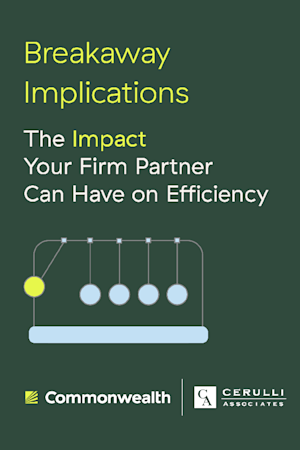Leaving the Wirehouse: Your Guide to Going Independent as a Financial Advisor

Feeling like a cog in the wirehouse machine? You're not alone. Many financial advisors have taken a different path—true independence, where they call the shots. This isn't about whether you should go independent; it's about when and how.
Independence means more than just freedom (though that’s a major perk). It's about building a business that reflects your vision, values, and client focus. But let's be real: owning your future takes planning, research, and the right partner.
Here's your four-step plan to leave the wirehouse and embrace independence:
1Know the Lay of the Land (a.k.a. The Rules)
Before you even pack your stapler, you first need to understand the rules of (dis-) engagement. Wirehouses have their own exit strategies (and they aren't always easy to navigate). You must know your employer's resignation requirements. Hire a securities attorney who specializes in advisor transitions, so you can ensure that you have the guidance you need to successfully navigate the process and any non-solicitation agreements.
2Choose the Best Tool for the Job (a.k.a. Your Business Structure)
One size doesn’t fit all in the independent world. You have several options for structuring your practice. Do you want to keep your commission business or transition to fee-only? Do you want your firm partner to handle regulatory oversight? Answering these questions will help you choose the right affiliation model for you and your clients:
Dual registration (the hybrid approach). If any part of your business is commission-based, and you’d like to keep that business when you move, you may want to consider dual registration. As a Registered Representative/Investment Adviser Representative, you’ll have the flexibility to continue working on commission while also doing advisory business for clients who prefer to pay a fee for your services.
Investment Adviser Representative (IAR—the fee-only focus). If you’d prefer to drop your commissions, work solely as a fee-based advisor, and promote yourself as a fiduciary, you can work as an IAR of an existing Registered Investment Adviser (RIA). This will also allow you to drop your FINRA registration(s) and receive compliance oversight from the firm you affiliate with.
RIA (total control). If you want to work as a fee-based advisor and have complete control over your business, you can establish your own RIA. In this model, you’re responsible for everything, including compliance (which is a significant undertaking).
Hybrid RIA (the strategic blend). You can continue working as a Registered Representative and still run your own RIA if you choose. Under this model, you’ll affiliate with a broker/dealer to process your commission business, but you’ll be responsible for compliance oversight of your fee-based business.
For some advisors, the thought of going independent and changing their business to 100 percent advisory may seem overwhelming. If this sounds like you, keep in mind that many firms offer a "glide path" to help you transition gradually. It's like easing into the deep end of the pool instead of jumping in headfirst.
3Chart Your Course (a.k.a. Your Path to Independence)
Once you’ve selected an affiliation model, decide which path you’ll take to leave the wirehouse. If you want to retain your commission business, you’ll need to affiliate with a broker/dealer. And if you’d like to work as an IAR, you’ll need to partner with an RIA for compliance oversight. But you still have decisions to make:
Go fully independent. If you opt to open your own RIA, you have full freedom to control how your business operates, where assets are custodied, and which technology platforms you use. You’re also responsible for your own compliance, so hiring or outsourcing a chief compliance officer is necessary.
Affiliate with an RIA–broker/dealer. Working as a Registered Representative and/or an IAR requires compliance oversight, so you’ll need to partner with a firm that can provide that. The good news is many firms also offer back-office services, including operations, marketing, and planning support.
Join an existing firm. To ease the burden of starting your own business, you may want to consider partnering with an established advisor or group of advisors. This can minimize start-up costs, provide instant brand recognition, and offer built-in support.
Find Your Wingman (a.k.a. The Right Partner)
Unless you're going fully independent, choosing the right RIA–broker/dealer is crucial. Choosing the right firm can make the difference between a rewarding journey and a challenging struggle, so be sure to look for:
A good fit. Culture can make a big difference in finding success with a firm. Do its values align with yours? Do you like the people?
Investment solutions. One reason you’re likely leaving the wirehouse is to have more flexibility in how you invest your clients’ assets. Does the firm offer the holistic investment solutions your clients need?
Infrastructure. The technology and tools you use to run your business affect how well you can serve your clients. Does the firm have the infrastructure to keep your business running smoothly?
Service and support. Identify a partner that will, through an integrated set of human and technological resources, add more client-facing time to your day. Does it offer the services and support you need to thrive (and not get bogged down in admin)?
Transition. A successful move to independence means ensuring that most of your clients move with you. Can your firm partner help you seamlessly transition your clients?
Why Commonwealth Is Right for You
At Commonwealth, you get more than just a platform—you get a partner in your success, offering the tools, resources, and support you need to thrive as an independent financial advisor. Here’s why advisors like you consistently choose us:
We’re not just about independence—we’re about empowerment. From day one, you’ll experience the difference of a firm fully invested in your success. Let us help you break through to new heights and achieve the future you’ve always envisioned.
Your Independent Future Awaits
Leaving the wirehouse is a bold move that can open the door to incredible potential. With careful planning, the right structure, and a strong partner, you can build a thriving independent practice. Stop dreaming about independence and start living it. Your clients, your business, and your future are waiting.

FREE DOWNLOAD
The Impact Your Firm Partner Can Have on Efficiency
Explore how choosing the right firm partner can put time back in your day.
This material is for educational purposes only and is not intended to provide specific advice.
Please review our Terms of Use.






